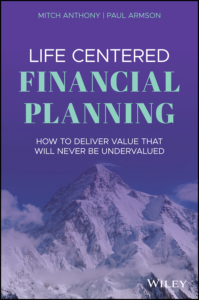Life-Centered Financial Planning Essentials: Focus on Behaviors that Produce Results
The core question driving the advice and planning world has been, “Do you or will you have enough money?” Little wonder then that advisors spend so much time validating allocations, investments, and returns, thereby creating a never-ending cul-de-sac dynamic where they must constantly justify how they are doing on a relative basis—resulting in a game no one can win.
The central question should not be, “Do you have enough money?” Instead, the central question should be, “Are you getting the best life possible with the money you have?” This question places the emphasis where it belongs: on behaviors that produce results. It’s the foundation of life-centered financial planning and the ROL (Return on Life™) approach.
What are the chief elements of a quality life tied directly to financial decision making?
- A sense of well-being.
- The sense that you’re making progress.
- The sense that you have freedom to live life the way you want.

One life-centered financial planner who integrated ROL into his practice shared that after going through the ROL process and discussing the results with a couple he’d been working with for many years, the couple told him, “That is the best conversation we may have ever had in the 30-plus years we’ve been married.” It shouldn’t really surprise anyone that clients actually desire a deeper, more meaningful dialogue around their finances. Talking about investments can never bring that kind of profound feeling to a relationship.
The opportunity we’re offering through life-centered financial planning and the ROL approach is to change the central question guiding the planning conversation.
That central question has always been about having enough money, getting a better return on investments, and making the most profit from your money. As stated above, the right question to ask instead is, “Are you getting the best life possible with the money you have?”
This question places the emphasis where it belongs: on behaviors that produce results. The posturing of this question places the planner in a position of “wisdom merchant”—one who can weigh in on what financial behaviors and principles need to be applied to better a client’s situation.
Change the central question you are attempting to answer, and the perception of your value will change with it.
Learn more in Life Centered Financial Planning: How to Deliver Value that Will Never be Undervalued, available at local or online bookstores as well as at mitchanthony.com.